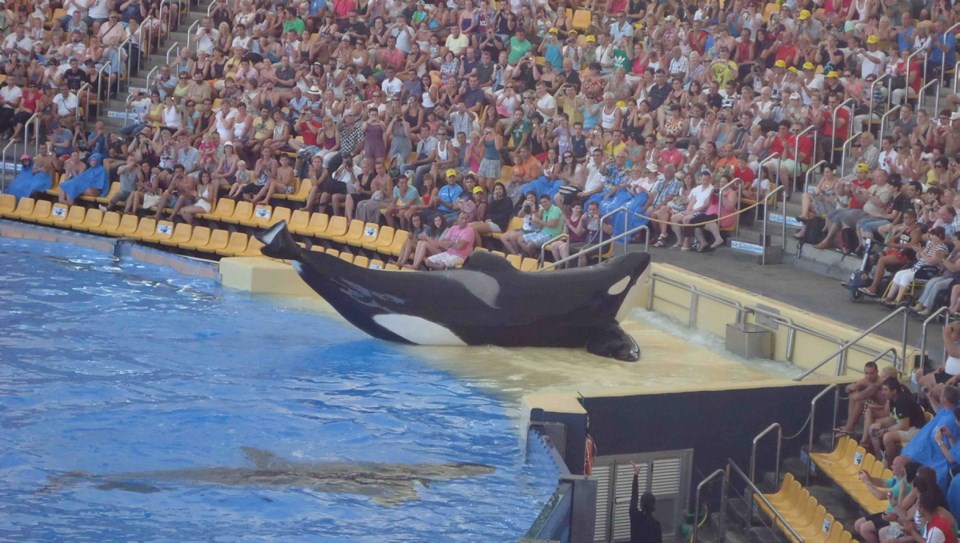The very thought of it seems absurd today — busloads of tourists rumbling into Oak Bay to laugh, clap and cheer at the wacky antics of trained killer whales dutifully doing acrobatic tricks in a circus-like marine park.
Especially when you can watch orcas cavort in their natural habitat in Juan de Fuca Strait.
If you visited Sealand of the Pacific in the 1980s, you might feel pangs of guilt along with heartbreak as you watch Blackfish, the Sundance sensation and potential Oscar contender with a huge Victoria connection.
The “star” of Gabriela Cowperthwaite’s revealing and moving documentary is Tilikum, the beloved and sociable killer whale whose local stardom came to a tragic end 22 years ago, hastening the Oak Bay marine park’s demise.
It was two years after Sealand trainer Keltie Byrne drowned after falling into the pool with the 5,000-kilogram bull orca and playmates Haida and Nootka. Nadine Kallen, one of two eyewitnesses interviewed in Blackfish, took issue with early news reports saying Byrne “drowned,” failing to mention what Kallen watched in horror: Tilikum dragging the panic-stricken trainer back into the pool.
“It felt like an amusement park that was on its last legs,” adds Corinne Cowell, recalling her impression of Sealand that day.
“All Sealand was, was a net hanging in a marina with a float around it,” notes whale researcher Ken Balcomb.
Blackfish, which opens Wednesday at Cinecenta, focuses on another Tilikum tragedy — the 2010 mauling and drowning of senior trainer Dawn Brancheau at SeaWorld Orlando, which purchased Tilikum in 1992. That is the same aqua-park he was flown to from Victoria after being unloaded from a flatbed truck onto a Hercules transport plane in the middle of the night.
Other unheeded red-flag behaviour included a trespasser’s drowning while in the tank with Tilikum at SeaWorld.
With such a significant local angle, it’s no wonder the Victoria engagement has generated so much anticipation. Ironically, we’ve had to wait months after Blackfish made its splash at Sundance, followed by its North American release.
“We’ve had more calls and emails about Blackfish than for any other film,” said Cinecenta manager Lisa Sheppard, who responded to the flood of inquiries by extending its one-week run to 11 days, the second-longest in Cinecenta history.
Blackfish is not an indictment of Tilikum but of a corporate culture that traumatizes these majestic creatures. Cowperthwaite convincingly suggests circus-like captivity can trigger erratic, potentially deadly behaviour. She asserts, with verification by whale researcher Howard Garrett, that no incidents of whale attacks on humans have been recorded in the wild.
Her exposé of the aquatic-animal business is emotionally wrenching, as when former trainers at Oak Bay’s Sealand recall their affection for their star attraction nicknamed Tilly, intercut with upbeat advertisements for Sealand.
“Tilikum was very well-behaved and eager to please,” recalls Eric Walters. “Tilikum was the one we trusted.”
Former Sealand director Steve Huxter recalls how older animals would bully Tilikum by “raking him” with their teeth. He also laments inhumane practices, such as confining whales in dark, cramped metal pens overnight, or food-deprivation for motivation. “It was just wrong,” he says softly.
On one expert’s claim that such conditions can induce psychosis, CNN anchor Jane Velez-Mitchell observes: “If you were in a bathtub for 25 years, don’t you think you’d get a little psychotic?”
Former Sealand trainer Christopher Porter hasn’t forgotten his parting words to Tilikum, assuming he’d have a better life.
“OK, Tilly, you’re going to Disneyland. Lucky you!” he recalls tearfully.
Huxter says it was his understanding that SeaWorld needed a breeder, and that Tilikum — still featured there despite being implicated in three deaths in captivity — wouldn’t be used in shows.
Blackfish is primarily devoted to assertions of animal abuse and negligence against SeaWorld, which declined to co-operate.
Alternately disturbing and revealing video footage of wild whale pups being captured, theme park mishaps — notably Brancheau’s fatal attack — and other footage such as clips from Orca!, Dino De Laurentiis’s outrageous 1977 disaster flick, is offset by persuasive testimony from regretful, older-and-wiser former trainers, scientists, activists and researchers.
It’s eye-opening as the trainers express empathy for the orcas, vent their frustration over negligence they witnessed and expose misinformation and dirty little secrets at odds with SeaWorld’s public image.
Particularly moving is tearful testimony from John Crowe, a contrite former whale hunter as he flashes back to 1970 when whale pups were separated from their howling mothers in Puget Sound.
“I lost it,” he recalls. “I just couldn’t handle it. … It’s like kidnapping a little kid away from its mother.”
While Blackfish’s tone is accusatory — SeaWorld eventually rebutted some contentions — Cowperthwaite makes a potent argument against such captivity of intelligent and affectionate creatures that were meant to roam the ocean, not a fish tank.
Her film’s message is all the more chilling when you consider how little has been learned since Tilikum’s years here.
“Not a damned thing,” says Dr. Dave Duffus, co-founder of the University of Victoria’s Whale Research Lab.
It does make you think twice about whether to visit a marine theme park ever again.
Blackfish screens nightly at 7:15 and 9 from Sept. 25 to Oct. 5, with weekend matinees.



